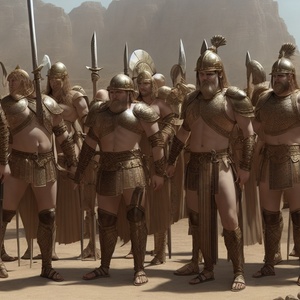The gate locked into place in its open position. To Gilgamesh’s surprise, the men had listened to him, staying in tight formation, spearmen at the front in a phalanx, bows and sling at the back, Gilgamesh in the center.
“If you heed my command, we may live to see another sunrise,” Gilgamesh said, not bothering to mention that even if they did survive, it would only mean a life of servitude until they inevitably were sent to the fighting pits once more. Really, death was a kinder escape than the life that awaited these men.
Gilgamesh tried to make out their foes from the gate opening, but It was raining in sheets, obscuring any view. One of the men pissed down their own leg. “Remember that death in the arena brings eternal glory. Enki will ferry our souls to the heavens. We will never dredge and toil in the netherworld.”
Gilgamesh himself did not believe in such foolishness. He had seen the callus heart of Enki. Though the sky serpent likely had the power to do so, he simply did not care enough for the lowly mortals to bother with what happened to their souls when their bodies died in service to him.
Enki was a cruel god, one who got great joy from watching his worshipers suffer. It seemed to Gilgamesh, all the gods shared such a proclivity. They made man for their amusement alone, and because none could stop them.
Power, that was the only true virtue. It was power that insulated Enki from the suffering and strife of his people. Power brought with it pleasure and protection. If no one was strong enough to oppose you, then you could do anything that pleased you.
Gilgamesh had amassed as much of it as he could, given his station in life. Orphaned from birth, he lived under a farmer’s reed roof in Eridu in his youth. His foster parents claimed Gilgamesh was given to them by the gods, that a falcon had swooped down and delivered Gilgamesh right to his foster mother’s bosom.
His foster parents were endearing, humble people of the earth. They were fools though, afflicted with the all too common disease of delusion. The belief that gods bothered themselves with the fates of mortals.
Gilgamesh knew the truth. His true mother was a whore who abandoned him, left him in the marsh to die so she would not have to care for a babe. His foster parents took him in not out of the kindness of their hearts, but so they could have another pair of strong hands to toil in the field.
This was the way of things. Gods and men both served themselves above all else. The smartest and strongest did whatever it took to remain that way. Even beasts of the forests did the same. They hunted each other to grow more powerful, just as man did. Nature was designed to cull the weak. Perhaps that was Enki’s wisdom. Only the most fit were worthy to survive. This was virtue, this was justice.
It was precisely for that reason, Gilgamesh would do whatever was necessary to endure this latest trial. “If we please Enki with our performance today, our souls will be exalted. We will dine in the halls of the heavens, and never again feel the burden of the plow, nor the pain of the knife. So fight, fight as though the fate of your immortal soul depends on it… because it does.”
Gilgamesh’s words stilled the make-shift slave soldiers. He could sense they had begun to focus. “Good. Courage and obedience, these are the virtues of a good soldier. If we must be ferried to eternity this day, let us give them reason for our names to echo through the ages!”
Gilgamesh drew his sword for flourish, pointing it straight to the heart of the arena. “Fight for Uruk, fight for Enki, for your wives and children, fight so that even in death, our deeds will be read in tablets across oceans of time. March now and stand in defiance of death, march to meet your destiny, to hold your fate and future into your own hands. Go now, to GLORY!”
The men cheered, clanging their weapons against their shields, charging forward at Gilgamesh’s command. As the men ran forward, Gilgamesh took a step back.










Comments (0)
See all